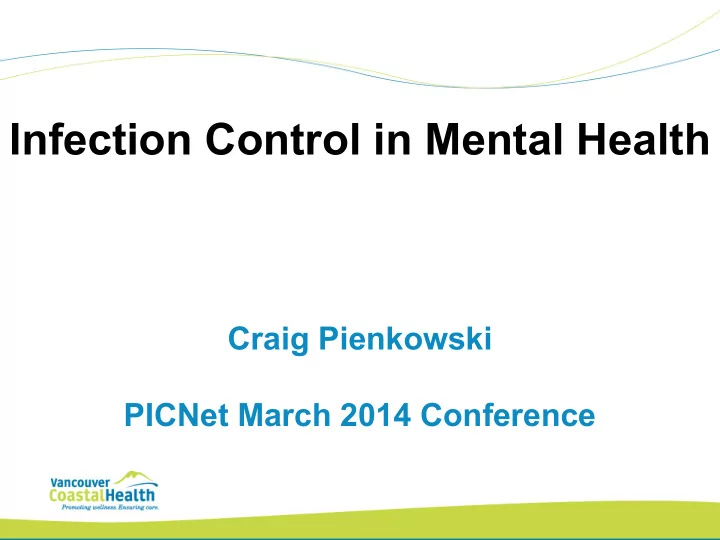

Infection Control in Mental Health Craig Pienkowski PICNet March 2014 Conference
Presentation Outline Population Facility / Unit Environment Diseases to Consider Outbreaks Sources
Mental Health Population Very mobile Might hide illness Substance abuse Can be very sociable with each other - may know each other in the community Tend to have lower level of hygiene, chronic wounds Occupational Therapy – group / food programs Similar aspects to residential care
Engaging Clients Placed non-alcohol hand rub Educate staff so more confident to encourage clients to participate in own care Encourage personal hygiene - shower daily - change clothing regularly - change bed linen regularly
Facility / Unit Environment Older – often multibed rooms, public toilet style, few sinks New – more / or all single bed rooms, more individual toilet Encourage group activities Recreation room Communal dinning room Similar aspects to residential care
Environment Solutions Placed non-alcohol hand rub Increased placement of disinfection wipes Push for more sinks and private rooms during renovations Increase control over snack food (increase staff workload)
Health Conditions to Consider Open wounds (acute and chronic) MRSA HIV HBV HCV
Strategies to Prevent Disease Transmission due to Open Wounds This document is to provide guidance to all staff on actions that should be taken to reduce the risk of disease transmission on the unit and within the facility. The following strategies will help prevent transmission in patients who have an open wound that is suspected or known to be infected. It is best if all or most strategies are used in combination. The following strategies apply only to those currently with an active infection and do not apply to those patients who are simply colonized with MRSA. Principle: How to Prevent Disease Transmission
Health Condition Solutions Created a document for Management of Open Wounds Education with discussion of implementation and practice (shaving razors and tooth brushes) to get staff to think about patient to patient risks, not just staff exposure risks
Outbreak Problems Health care vs. community transmission? Cancel group activities – increase stress Clients often go on pass – cancel vs. limit? Public toilet style – how to coordinate? In old units private rooms are often for seclusion
Outbreak Solutions Start with staff walk through with outbreak management protocol Asked nurses to include in documentation number of V+D episodes Designated one toilet for ill clients (partial success) Cancelled extended passes Good communication with the kitchen with regard to individual portions and staff control of snacks
Info Sources APIC – Behavioral Health APIC – Long-Term Care BCCDC CDC CSA – Construction / Renovation NHS – Matron’s Charter PICNet VCH Public Health – Food Safe, specific disease policies
Recommend
More recommend